IBC协议2023年度总结:跨链协议的黄金标准
Cosmos 團隊提出的IBC(Inter-Blockchain Communication)協議是一個完全開源、通用的區塊鏈跨鏈互通協議。其「分層技術架構」和開放的「技術開源策略」,讓IBC 可以支援功能豐富、無需信任的跨鏈互操作,成為當之無愧的跨鏈協議的黃金標準。
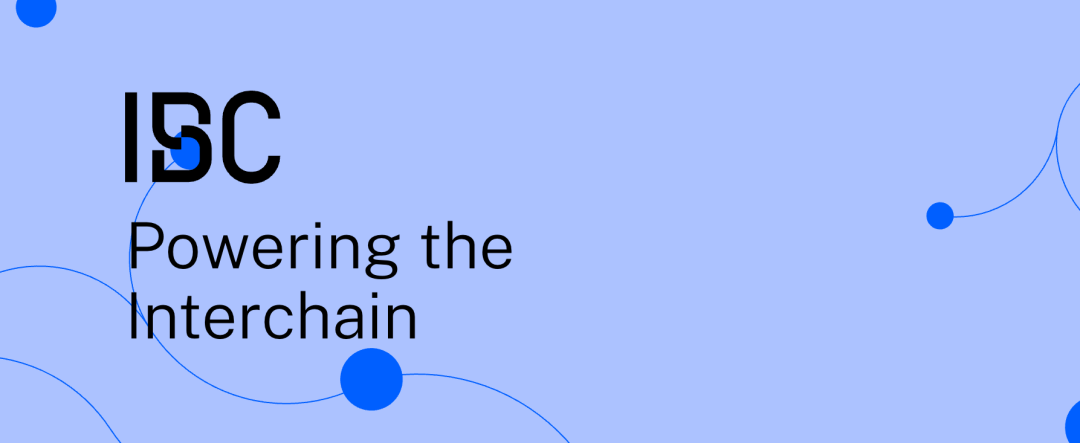
首發鏈接詳見「讀原文」
2023 全年,部署並且啟用IBC 協議的區塊鏈,從53 個增長到了107 個,僅在12 月單月,就產生了25 億美元的交易量,完成了超過530 萬次的通證跨鏈。
IBC 區塊鏈數量:
https://tfm.com/bridge?chainFrom=cosmoshub-4&chainTo=
530 萬轉帳https://mapofzones.com/zones?columnKey=ibcVolumeperiod=30d
同時,IBC Github 代碼庫共收到124 位貢獻者提交的代碼,進行了版本升級、新增了許多功能、工具和應用,並實現了與Polkadot 和Avalanche 測試網的跨鏈。
基於這些年的蓬勃發展,IBC 跨鏈協議正式進行了品牌重塑。
值得一提的是,儘管Rekt 排行榜中超過50% 都是跨鏈協議,但IBC 協議從未出現過,進一步驗證了IBC 的跨鏈黃金標準地位。
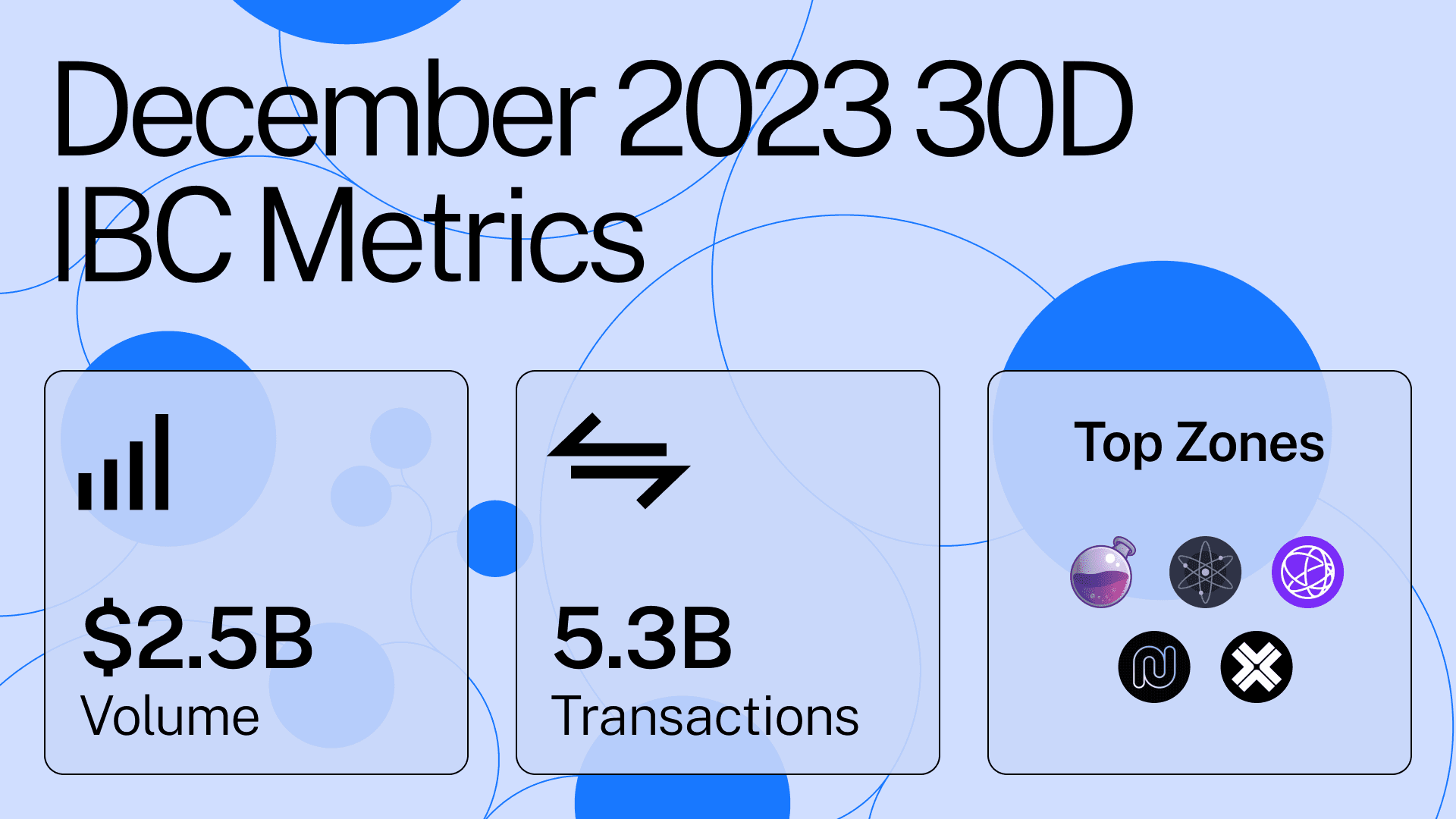
MapofZones.com
2023 年IBC 的採用與使用範圍有所擴大
IBC 在過去一年的採用數量有顯著的成長。截至12 月, 107 條鏈已經啟用了IBC,這比去年的53 條鏈有了102% 的驚人增長,它們大多數(>100) 基於ibc-go。每月能夠處理約500 萬次轉賬,這相當於25 億美元的跨鏈交易量。
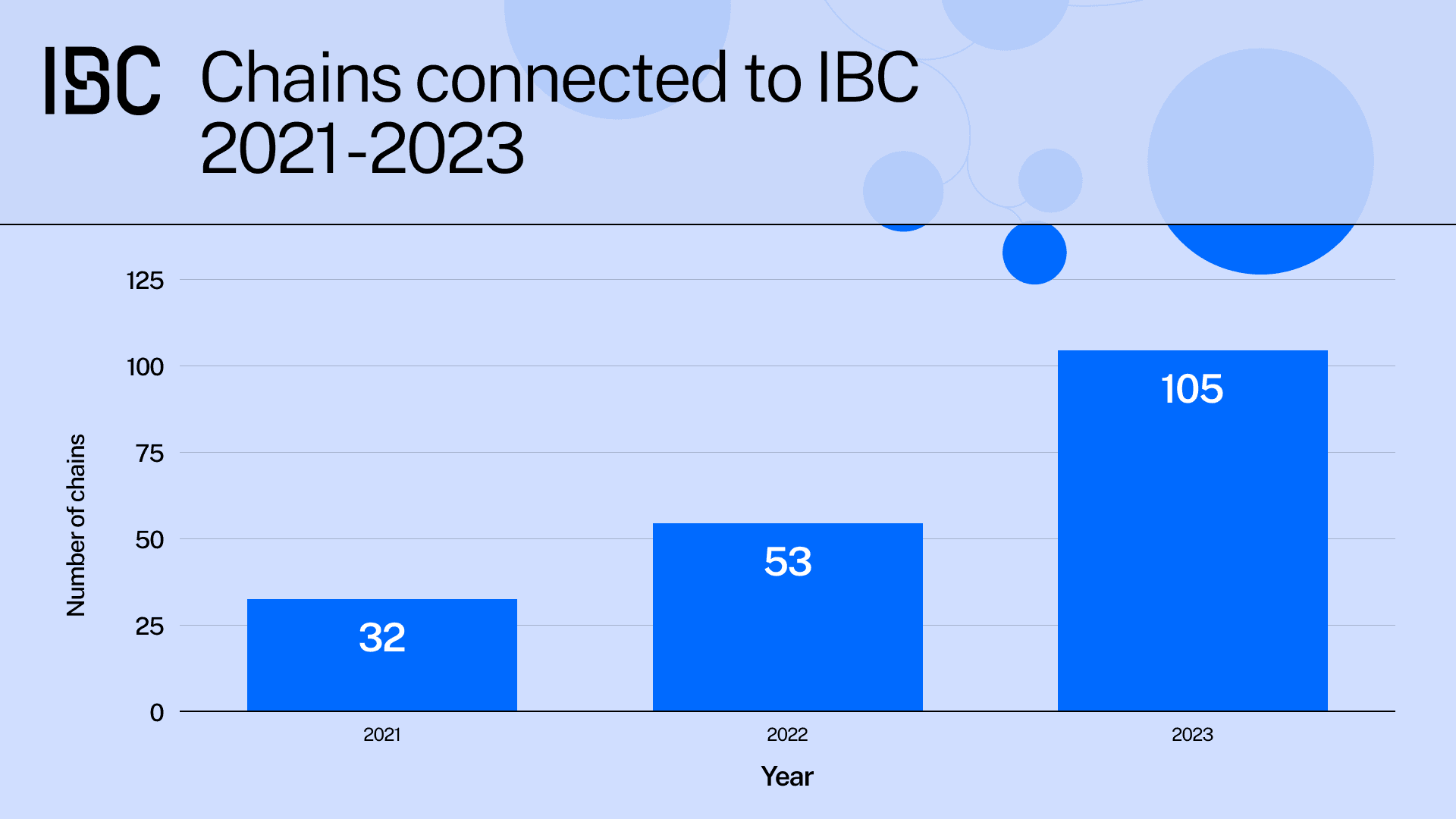
2023 年啟用IBC 的區塊鏈增加了102%
在MapofZones 的2023 年12 月中旬的30 天度量數據顯示,Cosmos DEX Osmosis 是IBC 交易量在跨鏈中的最大驅動力。像Celestia、 dYdX、 Noble 等新進駐的重要參與者已經加入跨鏈,它們帶來了充沛的USDC 資源,推動IBC 的交易量和交易次數在年末達到了新高。
在2023 年,IBC 的跨鏈範圍遠遠超出了Cosmos,建立了實時連接到Polkadot 的鏈接,以及連接到Avalanche 的測試網絡,並且以太坊、 L2s 和卷網絡的IBC 兼容性也即將發布。我們會在文章的最後部分詳細闡述這些生態系統的更新內容。
對ibc-go 來說,進一步採納的亮點功能是Interchain 帳號(ICA)。一年前,Stride 是ICA 控制器的唯一使用者。自從在ibc-go v6 中進行了重構,已經有34 條額外的鏈,加入了ICA 控制器子模塊/ ICA controller submodule,這也為49 條鏈實現相應的ICA 宿主功能/ ICA host functionality 奠定了基礎。
ibc-go v6:鏈間帳戶的改變
https://medium.com/the-interchain-foundation/ibc-go-v6-changes-to-interchain-accounts-and-how-it-impacts-your-chain-806c185300d7
34條額外的鏈:
https://lookerstudio.google.com/u/0/reporting/37cfb84a-8544-496b-92ff-0f7ff7dce1c6/page/HnOdD
ICAcontrollersubmodule、ICAhostfunctionality
https://ibc.cosmos.network/main/apps/interchain-accounts/overview#concepts
同時ibc-rs 開始展示其日漸增長的適應性。用戶包括Namada,一個注重隱私的L1 區塊鏈;Nomic,Cosmos 的比特幣橋;Octopus Network,構建了NEAR-IBC;以及ComposableFi,正在研究Solana<>Cosmos 的互通性。
Ibc-solidity 在跨鏈開發者社群中已經有越來越多的採用,潛力無限。例如Composable Finance 採用了這個模組,建立了以太坊和Cosmos 生態系統之間的橋樑。此外,TOKI 即將在公開測試網路上推出的橋樑,將促進以太坊和幣安智能鏈之間的連通性。我們期待出現更多擴展到EVM 生態系統的應用。
IBC 在2023 年的發布、特色和應用
關於ibc-go 2023 年,我們為ibc-go 帶來了兩個重磅更新:V7 和V8。
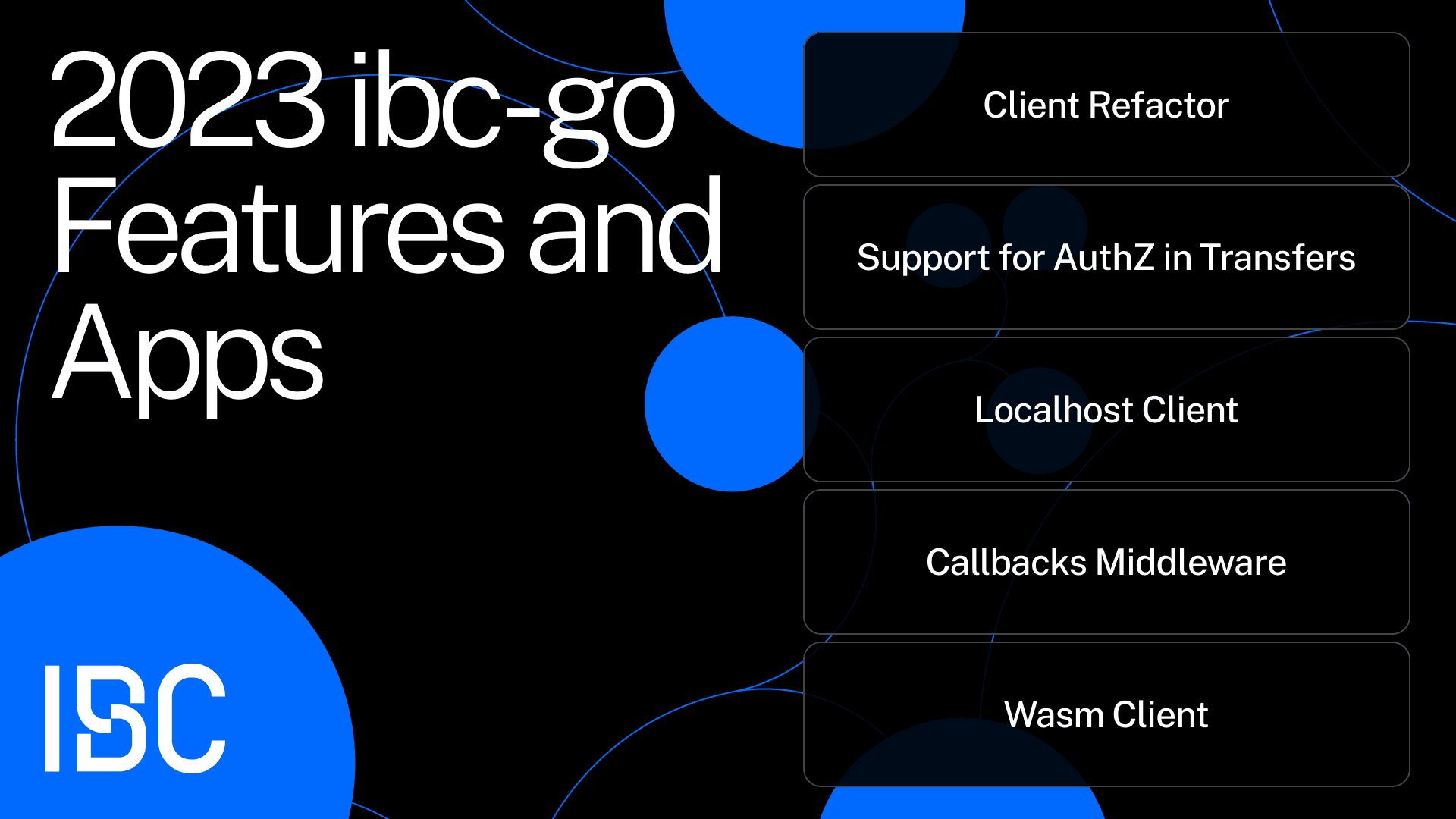
2023 年的ibc-go 特性與應用
客戶端重構
經過重構後,ibc-go 在使用不基於Tendermint 的輕量客戶端進行擴展到新網路時將更加容易。重構將02-client 子模組的某些功能移至不同的輕量級客戶端實作。
《客戶端重構:為IBC 跨生態系擴展奠定基礎》
https://medium.com/the-interchain-foundation/client-refactor-laying-the-groundwork-for-ibc-to-expand-across-ecosystems-61ec5a1b63bc
在ICS-20 中支援Authz
Authz 是一個Cosmos SDK 模組,能夠讓一個代理人執行某個人的某些操作,例如股權投注和解除投注。在ibc-go 的V7 中,我們增加了對ICS-20 中authz 的支持,這就讓代理人能夠代表授權人初始化ICS-20 通證的轉移操作。
Authz: https://github.com/cosmos/cosmos-sdk/tree/main/x/authz
本機/ Localhost 客戶端
在ibc-go 的7.1.0 版本中,我們引入了本地主機/ Localhost 客戶端,這個強大的改進提升了用戶體驗,使得用戶可以使用單獨的界面與同一條鏈上的多個智能合約或模組進行互動。這個客戶端讓鏈上的不同應用可以透過使用IBC 介面彼此交流。當封包傳送到本機主機客戶端時,它們會被內部路由到該鏈內的應用,而不是前往另一條鏈。我們由衷地感謝Strangelove 和Polymer 對這個特性的寶貴貢獻。
《介紹ibc-go v 7.1.0 》https://medium.com/the-interchain-foundation/introducing-ibc-go-v7-1-0-a4767a5f7beb
回調中間件/ Middleware
回調中間件/ Callbacks Middleware 是一個IBC 模組,它給已實現IBC 的鏈、產品以及智慧合約提供了進行回調的能力。它使得一個主要的應用,例如transfer 或是ICA,能夠向一些初級的應用如Wasm 或EVM 執行框架進行回調。這樣,像x/wasm 或ethermint 這樣的執行框架上的智慧合約在資料包生命週期期間就能接收回調。回調中間件有自己的go.mod,並在ibc-go 的7.3.0 版本以及更高版本中獲得支援。感謝Osmosis 團隊,Nicolas Lara,Alex Peters,以及Confio 團隊在開發此功能時的回饋。
ICS-08 Wasm 客戶端
Wasm 客戶端模組讓新增新的輕客戶端變得更簡單。它包括一個能夠託管輕客戶端字節碼的Wasm VM,因此輕客戶端可以用任何支援Wasm 的語言如Rust、C/C++、JS 或Go 進行開發。 Wasm 客戶端模組有它自己的go.mod,獨立於ibc-go 發行。
感謝Confio、 Strangelove、 Composable、 Chorus One 和Ethan Frey 對這個特性的寶貴貢獻。請閱讀部落格文章,以了解更多關於08-wasm 的資訊。
Wasm 客戶端https://github.com/cosmos/ibc-go/tree/feat/wasm-clients/modules/light-clients/08-wasm
Ibc-rs
Informal Systems 的ibc-rs 團隊在2023 年有四個主要的發布:v0.29.0,v0.40.0,v0.42.0 和v0.48.0,對於ibc-rs 提供了可用性改進和擴展功能。本節詳細介紹了2023 年推出的主要功能和改進。
1.重新設計API :團隊重新設計了API 以支援更廣泛的用例,目標是幫助團隊將IBC 帶出Cosmos。請查閱ADR 005 和ADR 007 。
2、改進的安全性和可靠性:全面的錯誤解決和與ibc-go 一致的高級驗證檢查。
3.選擇性的模組或域型庫導入:將ibc-rs 倉庫從一個整體庫重構為多個嵌套的庫,賦予用戶根據特定用例選擇性導入不同模塊或類型的靈活性。
4、Ibc-query 和ibc-testkit 庫:介紹了容納查詢ibc-rs 啟用鏈的實用特性和實現的ibc-query 庫,以及用於簡化測試的ibc-testkit 庫。
5.功能性客戶機的可升級性:主機鏈現在可以存取API 和升級提案實用工具,以處理升級客戶機訊息和提案。
6、No-float 和no-std 環境的兼容性:加入了No-float 和環境的兼容性,以實現更順暢的編譯體驗。
7.用於整合測試的重構的basecoin-rs :ABCI 應用basecoin-rs 經過了重構,現在是ibc-rs 整合測試的主要場所。
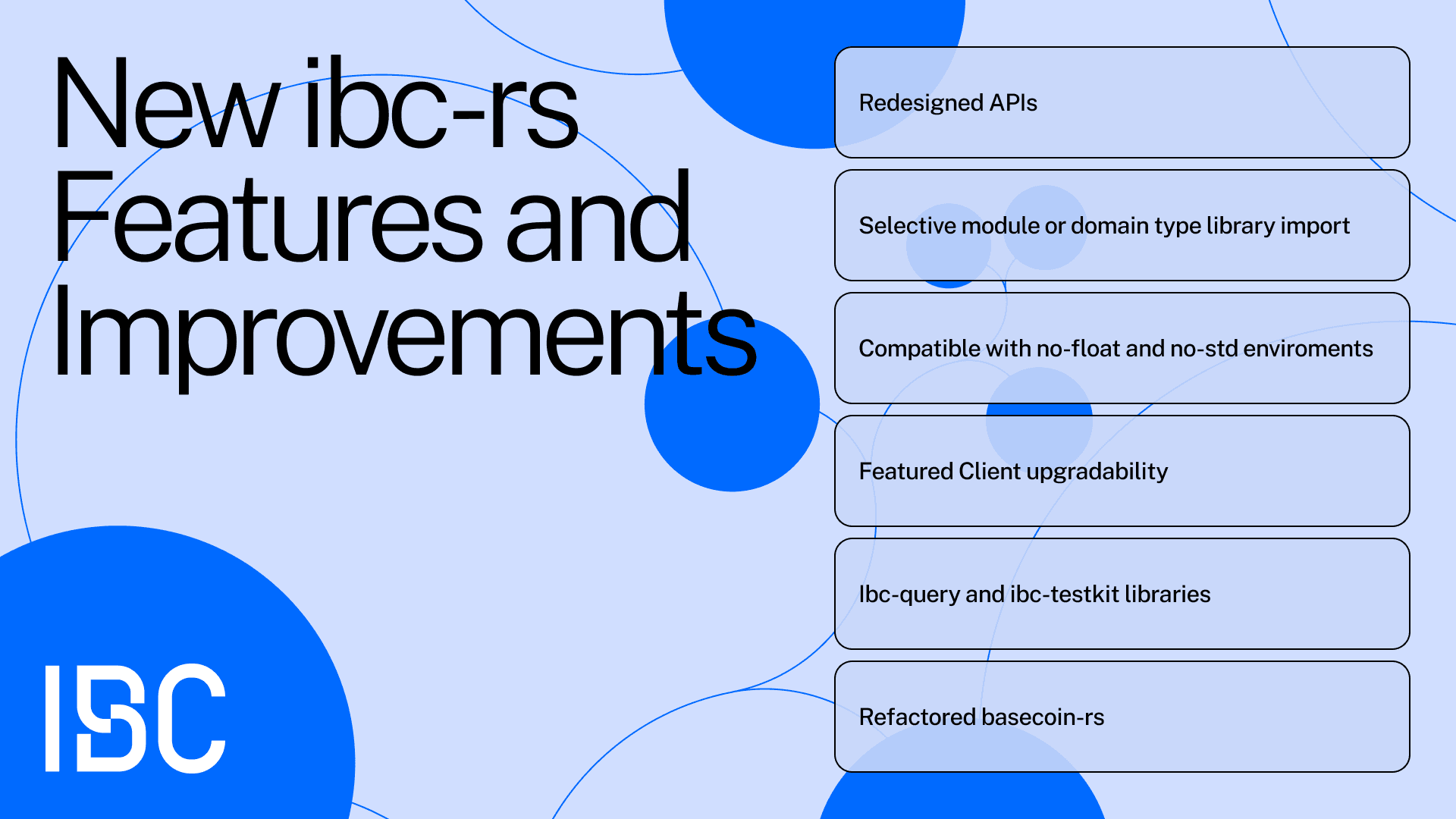
2023 年Ibc-rs 專注優化易用性
Ibc - solidity
Datachain 的ibc-solidity 團隊提供了一系列改進,提高了其對IBC 的Interchain 標準的符合度,同時支援向其他生態系統擴展。他們還展示了一個使用ibc-solidity 以及LCP 客戶端將以太坊和Cosmos (ibc-go) 連接起來的範例,實現了兩個生態系統之間的IBC 連接。以下是一些新增功能和改進的例子:
1、和ibc-go 的ICS-20、 ICS-03 和ICS-04 相容:ICS-20 的通證遷移支援,使IBC 應用能夠整合到諸如CosmWasm 合約調用基於EVM 的鏈路等混合生態系統中。 ICS-03 和ICS-04 為逾時及連線版本協商提供了支援。
2.重構ibc-solidity 模組:提高了以太坊等EVM 鏈的gas 效率,同時也方便EIP -2535 的應用。詳見PR 130 和234 。
IBC-go 的IBC 應用程式和開發人員工具發布
2023 年,IBC 應用和開發者工具的發布表現穩定,IBC 貢獻者社群始終致力於發布具有實用性的應用程式和工具。
1、Interchaintest
https://github.com/strangelove-ventures/interchaintest
強大且易於使用的IBC 多鏈測試環境,可幫助用戶快速啟動自訂的測試網和開發環境,以測試IBC,鏈基礎設施,智慧合約等。這個框架透過Docker 容器進行Go 測試,並且近期已擴展到包括私有測試網的本地- interchain 和Ethermint 整合。該框架由Strangelove 開發。
2、IBC Hooks
Wasm hook 是一個IBC 中間件,透過memo 字段,使得ICS-20 通證轉移能夠發起Wasm 合約呼叫。其中,跨鏈交易就是這個中間件的主要原語之一。此中間件由Osmosis 開發。
3、 ICS-721
https://github.com/cosmos/ibc/tree/main/spec/app/ics-721-nft-transfer
這個應用啟用了IBC 上的跨鏈NFT(非同質化通證)轉移。該應用由Bianjie 和Stargaze 共同開發。
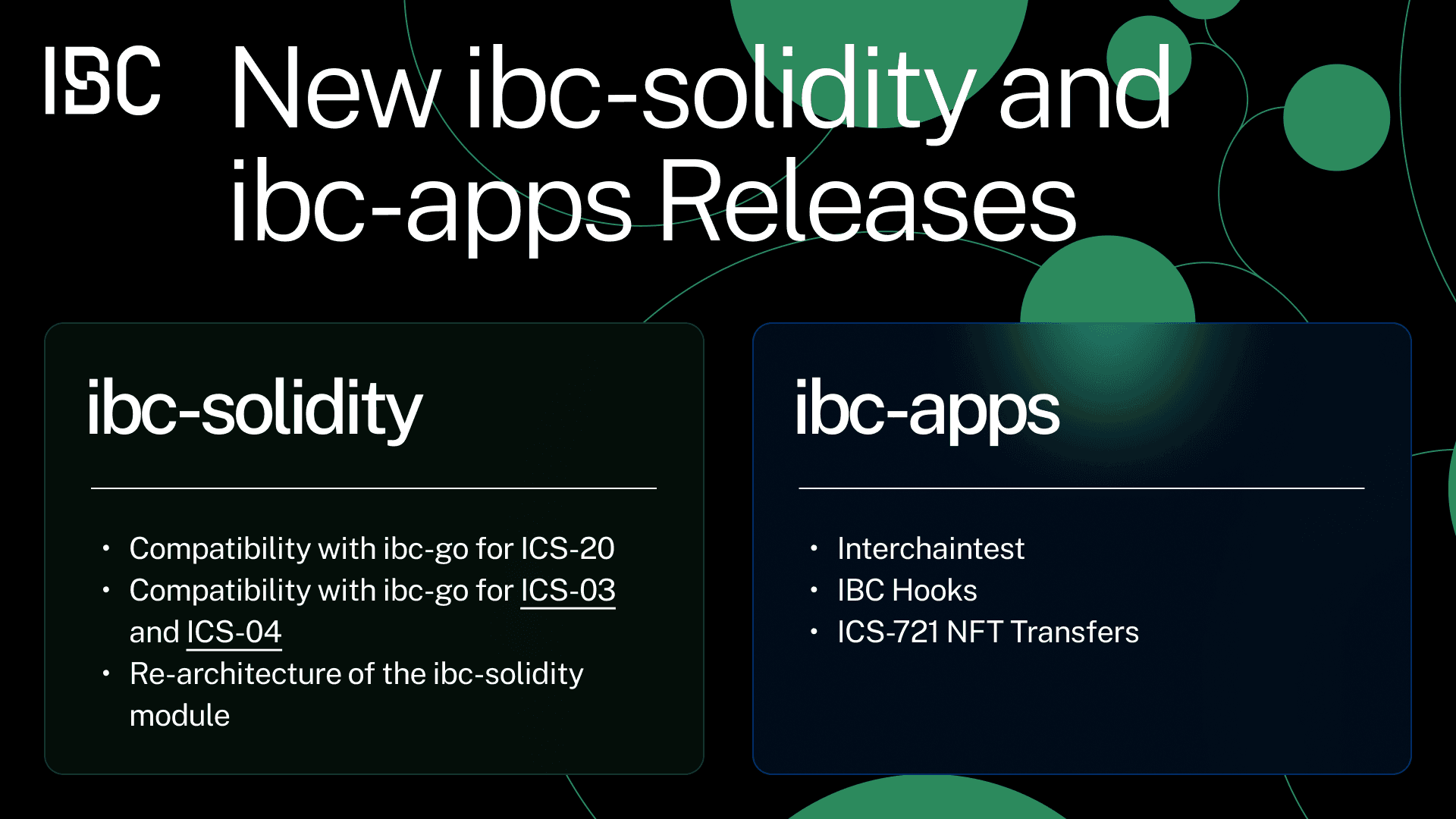
2023 年發布ibc-solidity 和ibc-apps
ibc-go 工程師對跨鏈技術堆疊的貢獻
Interchain 的分散式開發團隊都秉持著一個共同的目標,那就是創造出最好的技術堆疊。
ibc-go 團隊的Damian Nolan 發現了一個非SDK 倉庫的Ledger 簽名問題,並且成功地解決了它。他還向團隊提供了正確修復方案的文件。 ibc-go 團隊技術負責人Colin Axnér 發現並修復了Cosmos SDK 治理模組和SDK 錯誤字符串非確定性的問題;他的主動偵測和報告功能幫助防止了安全風險。 ibc-go 工程團隊也在今年發現並修復了幾個較小的跨鏈技術堆疊問題。這包括參數遷移問題,CometBFT key/value 的變化導致中繼器遺漏某些事件,以及SDK v.0.50.0 的起源遷移代碼中的錯誤參數等。儘管這些發現並不重要,但解決它們在保持Cosmos SDK 和CometBFT 的強大和可靠,以及IBC 協議的穩定方面起了關鍵作用。
今年,我們大幅改進了端到端(e2e)測試流程,使我們能夠更有效地檢測和處理問題。我們要感謝Strangelove 建立了interchaintest 框架,這是我們e2e 測試過程的基礎。我們要對建立Interchain Stack 的團隊表示深深的感謝,特別是Informal Systems,Binary Builders,Confio GmbH 和Strangelove。識別和解決和堆疊相關挑戰的協作過程強調了Interchain 生態系統的相互關聯性。這顯示了我們全球網絡的精神,共同努力帶來持續的改進和成長。
GitHub 資料:向IBC 開發者社群致敬
IBC 的力量來自其貢獻者。
IBC 的Interchain 標準、ibc-go、ibc-rs、ibc-solidity 和ibc-apps 的GitHub 倉庫有著124 個貢獻者,他們中許多人在IBC 啟用的鍊和應用上工作,並主動投入時間來改進協議。總的來說,IBC 貢獻者社群致力於數百個創新項目,共同推動了協議的發展,並在開源程式碼的同行評審中投入了大量時間。
去年,ibc-go 的生命週期中擁有了52 個外部貢獻者,然而到2023 年這個數字增加到了80 ,實現了顯著的53% 的增長。以下的表格顯示了截至2023 年11 月27 日,ibc-go 的前5 位外部貢獻者在提交次數上的表現。 Interchain 的IBC 團隊對這些人以及所有IBC 貢獻者表示最深的感謝,他們的無私貢獻將IBC 的發展推進了一大步。
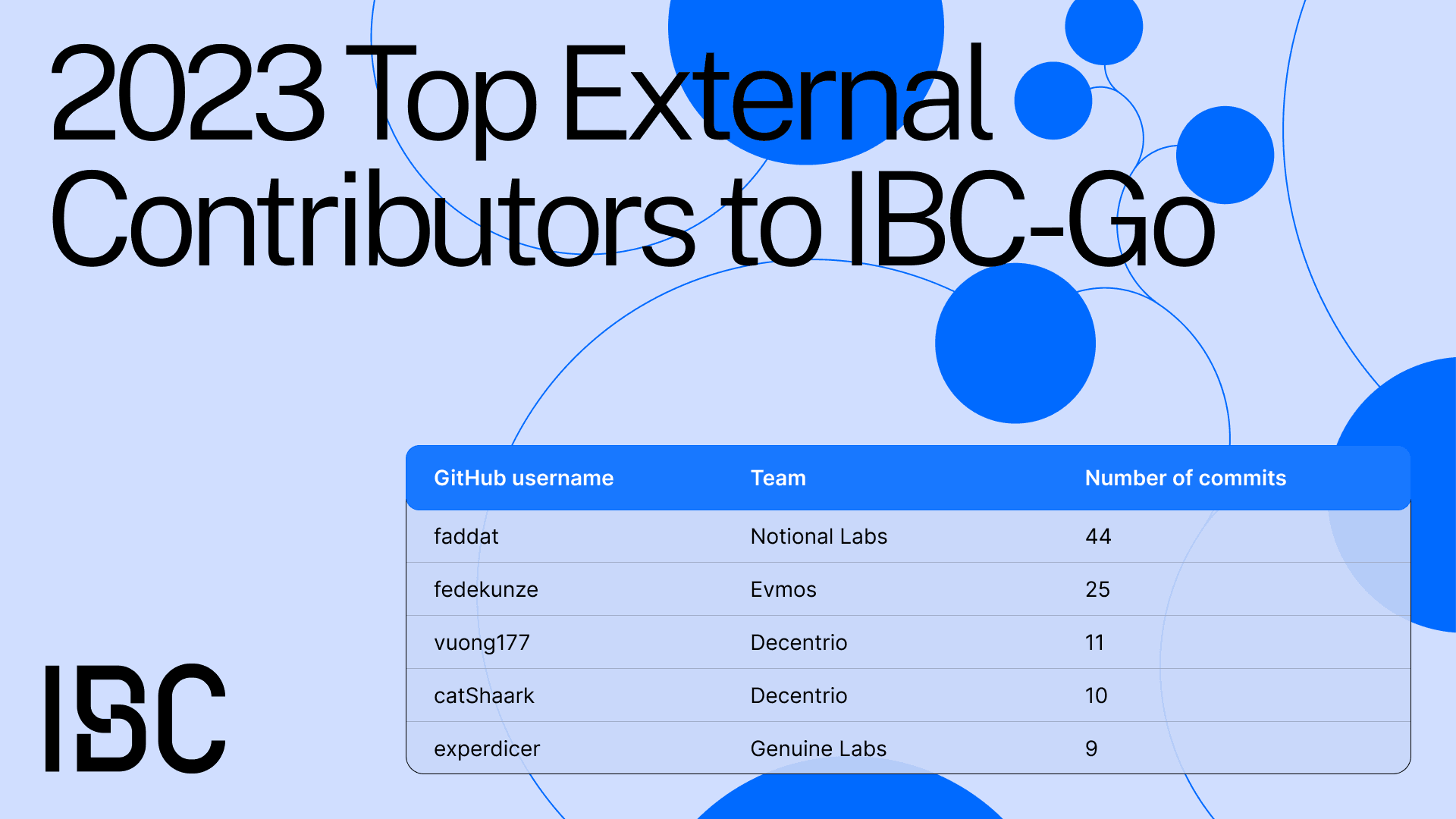
關於GitHub 的活動,這裡有一些數據可以顯示直到2023 年11 月底,ibc、ibc-go、ibc-rs、ibc-apps 和ibc-solidity 倉庫的開發進度。今年一共有1742 個PR 合併。
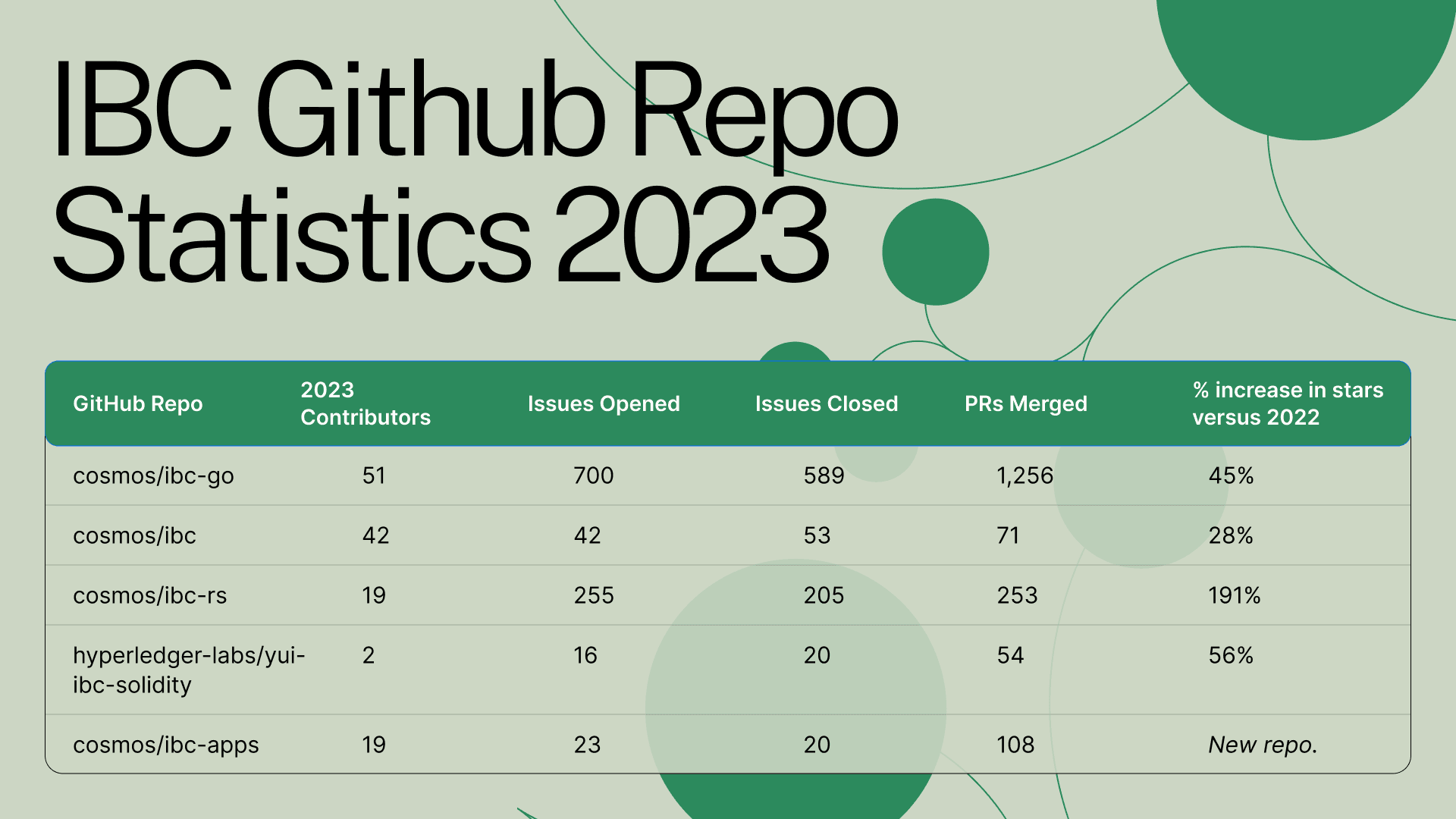
2023 年IBC Github 合併1742 個PR
生態發展
2023 年IBC 協議的開發達到了幾個重要的里程碑。
IBC 品牌重塑
今年,Interchain GmbH 為IBC 做了全新的形象設計。 9 月正式公佈了全新的網站,展示了全新的IBC 協議。
https://www.ibcprotocol.dev/IBC 官方的Twitter/X 上個月上線,專為參與IBC 開發的開發者和團隊提供服務。
https://twitter.com/cosmos
三菱金融採用IBC
科技在所有的肯定性進展中,最重要的可能是日本的頂級銀行,MUFG 決定採用IBC 進行跨鏈穩定幣支付。 Datachain 及其合作夥伴TOKI Finance 作為開發團隊,他們倡導並推動了企業對IBC 的採納。他們是一家名為Progmat Inc. 的電子證券平台的主要開發者,該平台由三菱UFJ 信託銀行公司推出,主要用於實現電子證券和穩定幣的跨鏈清算。它們的不懈努力使IBC 在日本的企業市場中成為最理想的區塊鏈互通解決方案,這也證明IBC 完全有能力適應大型金融業務的需求。
IBC 成功接入Polkadot 和Kusama
今年7 月,Composable Finance 團隊成功實現了Cosmos 鍊和DotSama 生態系統(包括Polkadot 和Kusama )的IBC 連接。借助他們的IBC 連接項目Centauri,Polkadot 網絡首次實現了跨鏈互動。
推進中的Rollup-IBC 互通性項目
目前,有多個團隊正在研發IBC 與rollup 互通計畫。其中,Dymension 正在推動其他rollup 項目在他們的基礎上進行部署。這樣,所有的rollup 都能利用IBC 實現互聯互通。此外,他們還正在開發一款名為eIBC 的中間件,可以在不等待爭議期的情況下實現樂觀rollup 的通證轉移功能。目前,Dymension 已經擁有千餘個已部署rollup 的激勵試驗網。
為製定rollup 的開發框架Rollkit 與在Interchain Foundation 的IBC 團隊正合作進行界面整合,使得Rollkit 與rollup,以及Rollkit 與IBC-enable 的鏈之間都可以透過IBC 進行交流。另一家名為Sovereign SDK 的ZK-rollup 框架公司,也在與ibc-rs 團隊共同研發一個SDK 的界面模組,以實現使用Sovereign SDK 構建的rollups 能夠通過IBC 實現交流。
IBC 正一步步接近以太坊
作為用戶活躍度、流動性、開發者傾向以及市場份額都處於領先的鏈,把IBC 整合到以太坊主網是一項優先級極高的工作。 Union 團隊最近宣布他們在將IBC 整合到以太坊主網方面取得了進展。他們已經有一個測試網,在Cosmos 和以太坊( Sepolia 測試網)兩方都完全工作的輕量級客戶端,會員認證和非會員認證,全功能的中繼器實現,以及一個零知識證明器。 Composable Finance 也已經有一個針對Cosmos 與以太坊IBC 連接的測試網。 Polymer Labs 最近也宣布他們從Cosmos SDK 鏈切換到了結合了Cosmos SDK 和OP 堆棧的二層rollup,旨在提供從Cosmos 鏈到以太坊主網以及其他rollup 的IBC 互通性。以太坊本身也將在其rollup 中驗證IBC 的執行。 Landslide 宣布了針對將IBC 整合到雪崩的測試網Landslide 是一個雪崩子網,目標是作為把IBC 整合到雪崩生態系統的入口,使得Cosmos 鏈可以和雪崩子網進行互通,反之亦然。 Landslide 目前有一個有激勵的測試網,併計劃在明年推出主網。
展望2024 年
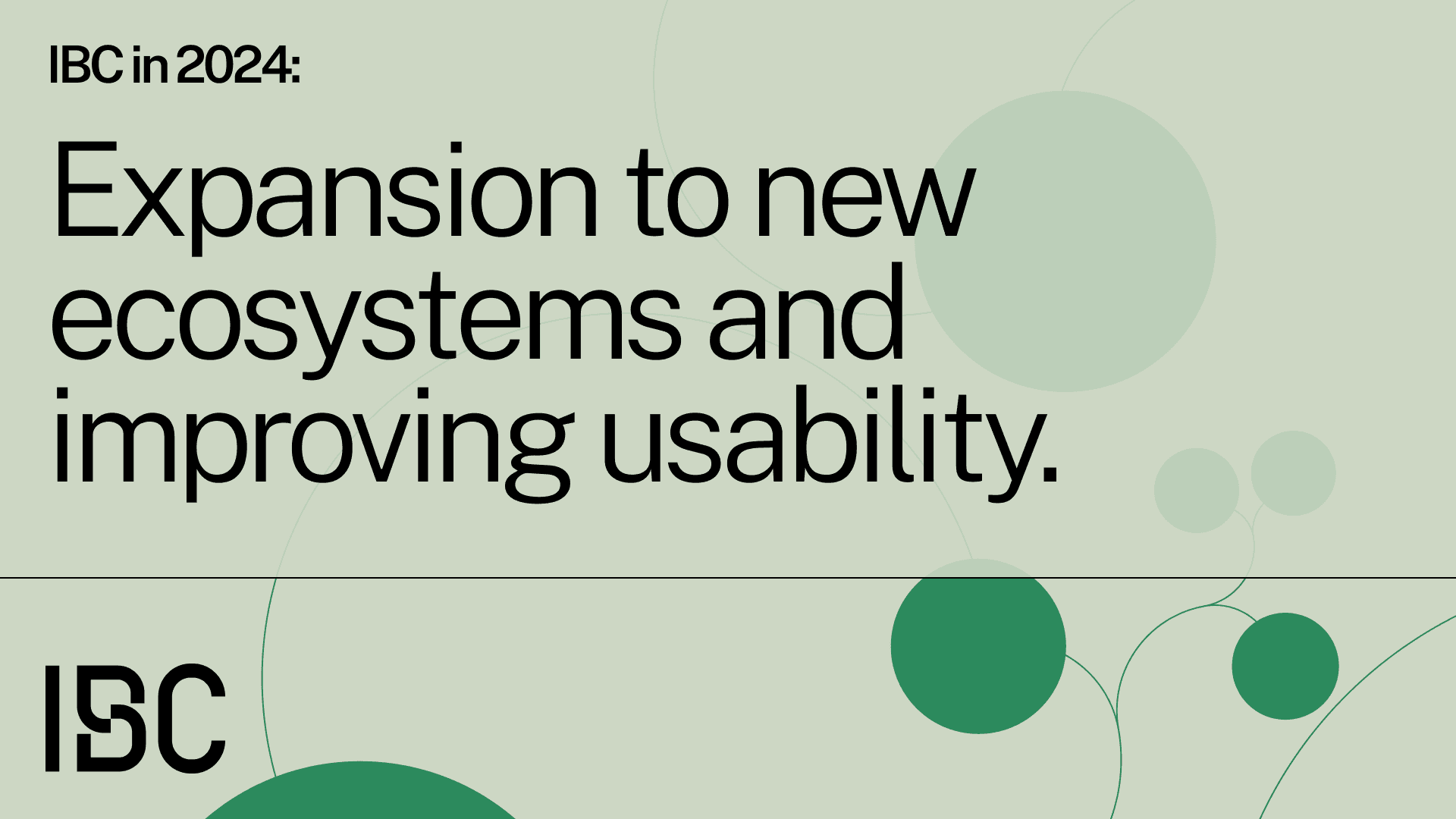
2024 年的IBC 目標是擴展和提高易用性
跨鏈通訊協定的強大之處源於其大量的開發者、用戶和愛好者組成的社區,每年都在推動協議發展,並且達到新的高峰。 2024 年,IBC 的兩大目標是擴展到新的生態系統並提升協議的易用性。重點包括OP Stack、 Rollkit 和Sovereign SDK 在內的rollup 框架集成,測試框架和開發者工具的改進,對現有功能的增強等等。我們將在2024 年年初發布文章做更詳細的介紹。我們相信,IBC 必將成為區塊鏈的TCP/IP 而被廣泛採用。
免責聲明:本文僅供參考,不得用作法律、稅務、投資、財務或任何其他建議。



